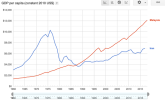Vietnam lost even more and went through an even longer period of total warfare fighting some of the biggest world powers(France, U.S, China) and military clashes with its ASEAN neighbours like Thailand, cambodia invasion etc etc on its soil than Iran....so can't use only historical excuses for current predicaments.
Vietnam did not lose half it's population, so that's not factual. What Iran went through at the end of WW1 was deadlier than anything experienced by Vietnam.
For your second point, Iran was actually ahead of its peers economically even pre islamic revolution of 1979. Be it South Korea, Turkey or Malaysia etc. However that's not necessarily the case today.
https://www.macrotrends.net/countries/IRN/iran/gdp-gross-domestic-product
Check the image I attached for more info's about this for example.
The only figure you cited is GDP. This is pretty misleading though, since Iran's GDP was being artificially bloated by her wealth in crude oil, of which Iran used to export a lot more than she does today, in particular after the 1973 oil crisis. Moreover the dividends were distributed in unequal ways among a tiny privileged elite linked to the Pahlavi regime and the rest of the population.
In terms of actual economic and human development however, the picture starkly differed. In the late 1970s south Korea was exporting its own cars already, as opposed to Iran.
As I said, it's foolish to think normalising relations with so called "western imperialists " is a crime or unnecessary lol. So you think China, Indonesia, India, Russia(pre Ukraine sanctions, they actually still want trade relations with us but we can't anymore due to their invasion of Ukraine), Vietnam, Brazil etc etc are all fools then to have normalised economic and trade ties with the West right? Lol If you think so, I can only hope your leaders think the same way, so the current status quo can carry on then for many more decades to come for Iran, since it benefits Iean so much.. Afterall the U.S doesn't have much to lose in this situation anyway to be honest.
When did Brazil, Indonesia, India or Russia break off ties with western regimes to normalize them afterwards?
What I stated is that Resistance to imperial oppression always pays off if conducted properly. It something that's verified in the case of the Iran, since the pace of development experienced under the Islamic Republic has surpassed anything achieved by the toppled pro-western monarchy by a noticeable margin.
Again, normalising ties and trade with western countries isn't unique to Iran. Most countries in the world apart a few pariah do.
The pariahs are western and zionist imperialists, not the other way around. With nations increasingly shifting their foreign relations to the East, this reality is being translated into hard facts on the ground.
In short, it just gives you opportunity to trade and attract investment in your country like any normal country does.
Western regimes aren't the only ones capable of enabling trade and investment. Normalcy isn't defined by the degree of ties with the west.
Of course it doesn't automatically means you will be successful, it just means you have the opportunity to tap your internal growth and global growth opportunities if you adopt the right policies. Its like China pre and post 1979 during the closed off Mao era and after Mao's death and the country's reform and opening up in the 80s. It gave the opportunity for the Chinese to tap the global market and adopt reform policies badly needed at the time. Without the opening up it will have been difficult for them to tap into the world's market and global growth opportunities and attract investments and upgrading of their industries to world standards etc etc. But yeah the Chinese government had to also adopt deep reforms internally to facitate this growth so its not just abiut opening up or normalising relations, it also has to be accompanied with deep reforms internally to match up with that. Else it will be pointless and the effects will be hardly impactful for the country as much as they should have been.
Groundwork for China's economic take off was laid long before Deng's economic reforms and even earlier than Nixon's visit to Beijing.
Also Beijing opting for enhanced economic exchange with the west in the mid-1980's was a consequence of it falling out with the Soviet Union. Its options were therefore limited. In today's world however other avenues are on offer. This evolution towards triumphant multipolarism was brought about thanks to the Resistance of a handful of nations brave, capable and foreseeing enough to stand up to (zio-)American hegemony, with Islamic Iran leading the way and making it possible for China and Russia to follow suit.
Last but not least, China's political rapprochement with NATO didn't last much more than a short decade and a half. Whereas in the economic realm, the relationship has meanwhile turned into one of competition and rivalry more than cooperation and alignment.
For your last point, I already said Vietnam came from a far more lower base than Iran dude. So it will take more time for them to catch up.. Vietnam was actually one of the poorest countries in Asia and even the world for a long time prior to their reform and opening up and dumping their failed soviet commie economic policies. Vietnam started really drawing Western, Japanese, korean , Chinese companies just over a decade ago, and the country has made rapid stride in improving its living standards, infrastructure, and GDP since then. Iran was way ahead of Vietnam even pre Islamic revolution..so don't know the point you trying to make. Vietnam is just trying to catch up now.
In other terms you have no actual point, but are basically offering speculation.
Moroever one of the main reasons China like any other country in the world for that matter doesnt invest much in Iran is first due to the sanctions on Iran since most companies with exposure to the West don't want to affect their business by doing business in Iran and coming under sanctions, so many stay away(including India, except when they get waivers from the US.) Secondly, Iran itself doesn't encourage foriegn companies from investing in the country due to its own laws hindered by unfavorable or complex operating requirements for foreign companies etc. So little FDI.
Unilateral USA / EU sanctions are no longer the game changing factor they used to be. As can be seen from how China, India and other nations of the global south are happily ignoring western sanctions and continuing to buy Russian oil and gas, for instance.
Iranian legislation is not an obstacle to Chinese investment either. The issue is political in essence, because until recently Iranian authorities weren't putting enough effort into attracting Chinese investment, not to mention alienating China - I'm referring to the former liberal and western-appeasing Rohani administration, seeing how it put all its eggs into the misleading basket of normalized ties with western regimes, something that's not going to happen unless Iran gives up her sovereignty and instruments of self-defense.
Yes, China moving to Vietnam has everything to do with the West dude and even more so with Hanoi normlising ties with the West.
China investing there is actually partly meant to pluck Vietnam away from the western orbit. It has to do with it in that sense.
You think if Vietnam didn't have good ties with the U.S/West, then how will they have free trade agreements and tariff exempt goods allowed into U.S /European market? Lol China is making use of this loophole to move factories to Vietnam so they can avoid tarrifs U.S/E.U countries imposed on their products and export to this markets.
Moroever, Hanoi normalising ties with the West and China(note that China and the West had good ties in the late 70s to 90s) was part of Hanoi trying to cone out of its isolation and sanctions(Yes Vietnam was under complete sanctions and embargoe by not just the West but also CHINA.

). So they had nobody to trade with or attract investment from. Luckily their leaders realised their position was untenable with the fall of the Soviet Union(their only ally/backer) and so came around and normalised ties with the West and pull out their ambitions over their neighbours (which was also draining their limited resources) and normalised ties with the West and made peace with China as well by solving their land border dispute (though maritime one persists) .
China has moved to delocalize some of its industrial production to East Asian regional neighbors for a variety of reasons, rising wages and production costs at home being one of them. Whether they opted for relations with western regimes or not, sooner or later these countries would have attracted Chinese investment anyway.
Resisting western imperialism and holding out on this path always pays off when gone about smartly. Whereas straying from such a path may prove fatal, as the examples of Qaddafi's Libya and countless other short sighted governments viciously stabbed in the back by Washington and Brussels amply demonstrate.


vietnamnet.vn








